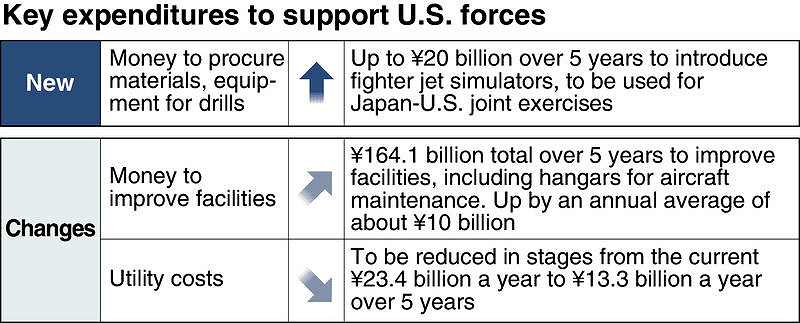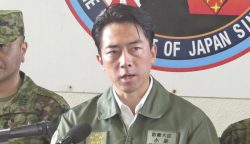
16:08 JST, December 22, 2021
Japan has agreed with the United States that it will provide ¥1.0551 trillion from fiscal 2022 to fiscal 2026 as host nation support for U.S. forces stationed in this country.
With the ascent of China and other factors in view, the funds — known as the “sympathy budget” — contain increased funding to enhance the interoperability of the Self-Defense Forces and U.S. forces stationed in Japan, thereby strengthening deterrence.
By putting more emphasis on areas that will bolster Japan’s defense capabilities, the government is seeking to make a qualitative shift from the concept of a sympathy budget. It has newly dubbed the payments a “budget for strengthening the alliance.”
“To date, we have emphasized our support for the U.S. forces stationed in Japan,” Foreign Minister Yoshimasa Hayashi said at a press conference. “This time, we have agreed on building a foundation to reinforce the Japan-U.S. alliance. The name ‘sympathy budget’ does not properly reflect the content of the agreement.”
Under the new agreement, annual funding will average about ¥211 billion, surpassing the ¥201.7 billion payment for fiscal 2021 by about ¥10 billion.
The main pillar of the new agreement is the introduction of “expenses to procure materials and equipment for drills.” During negotiations, the U.S. side asked Japan to improve the training environment for U.S. forces stationed in Japan.
Japan concluded that enhancing the two countries’ capability to respond jointly will directly reinforce Japan’s defense capabilities, so it would be able to win the public’s understanding for increased funding. Japan will pay up to ¥20 billion over the next five years for expenses related to introducing cutting-edge, AI-supported fighter jet simulators and other resources, on the assumption that they will be jointly used by Japan and the United States.
To maintain the rapid response capabilities of U.S. forces deployed in Japan, expenses for improving the facilities provided to those forces, such as maintenance hangars for aircraft, have been raised to a total of ¥164.1 billion over the five years.
In contrast, support for utility charges at U.S. bases in Japan will be reduced in stages from the current ¥23.4 billion a year. “It’s difficult to clearly perceive their contribution to reinforcing deterrence,” Hayashi said.
The margin of cuts will total ¥28.5 billion over the five years.
Japan’s cost-sharing for U.S. forces stationed in Japan started in 1978, covering the social services costs of civilian employees working at U.S. bases. The term “sympathy budget” took hold after then Defense Agency Director General Shin Kanemaru said during a Diet session, “It would be fine [for the Japanese government] to show sympathy [to the United States] if it would enhance trust.”
Since then, however, the funding has increased, primarily due to U.S. requests. The idea of Japan paying the wages of people working at U.S. bases’ recreational facilities, including a golf course, attracted criticism in 2008, and the special agreement between the two governments failed to win Diet approval.
Both governments will sign a new special agreement shortly, and the Japanese government will submit a bill to approve the agreement to the ordinary Diet session slated to convene next month.
Top Articles in Politics
-

Japan PM Takaichi’s Cabinet Resigns en Masse
-

Sanae Takaichi Elected Prime Minister of Japan; Keeps All Cabinet Appointees from Previous Term
-

Japan’s Govt to Submit Road Map for Growth Strategy in March, PM Takaichi to Announce in Upcoming Policy Speech
-

LDP Wins Historic Landslide Victory
-

LDP Wins Landslide Victory, Secures Single-party Majority; Ruling Coalition with JIP Poised to Secure Over 300 seats (UPDATE 1)
JN ACCESS RANKING
-

Japan PM Takaichi’s Cabinet Resigns en Masse
-

Japan Institute to Use Domestic Commercial Optical Lattice Clock to Set Japan Standard Time
-

Israeli Ambassador to Japan Speaks about Japan’s Role in the Reconstruction of Gaza
-

Man Infected with Measles Reportedly Dined at Restaurant in Tokyo Station
-

Videos Plagiarized, Reposted with False Subtitles Claiming ‘Ryukyu Belongs to China’; Anti-China False Information Also Posted in Japan




















